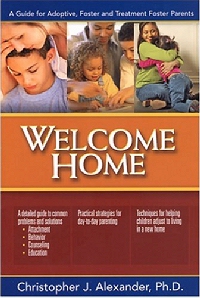
Welcome Home:
A Guide for Adoptive, Foster and Treatment Foster Parents
by Christopher J. Alexander, Ph.D.
Mountain West Publishing, 2004
Reviewed by Barbara Free
This is a very useful book for the intended audience. It should probably be required reading for all professionals who work with foster systems, with CYFD placements, and adoptive parents of children adopted later than early infancy. Agencies should have multiple copies. In fact, all placement agencies should have this book, because the chapters on gay and lesbian parenting, and discussions of who should know the child is adopted, are extremely important information. Today, with fewer relinquishments at birth, a larger percentage of adoptions are, in fact, these older kids, some with significant histories of trauma. The placement systems has not always served adoptive parents well in informing them of a child’s difficulties, and so has certainly not served the children well. Until recently not much was understood about trauma and the effects of family violence on children. Dr Alexander gives valuable information on topics related to this, including some detailed guidelines for parents. Wile some of us might disagree with adoptive parents making sure the child does not see his court papers, we must remember he is not referring to “normal” adoptive situations. It might be helpful if he also clarified that when the adoptee becomes an adult, he/she is entitled to all that information. It was interesting to note that the author said studies have shown that a great majority of those who are in the foster system until 18 years of age nearly always return to their birth families, while those who are legally adopted have lower percentages of returning. It might be those who remained in foster care also still knew where their birth families were, or had maintained some contact. And fewer of those who were adopted had that knowledge or contact. It might also be that the lack of permanence implied by being with a foster family and not adopted means the person does not have a sense of having any other family except the family of origin. It might be interesting to see what the figures are for those who are adopted in late childhood or adolescence and maintain contact with siblings, whether they later contact birth parents or not.
While this book is certainly not in the vein of “Here’s how to adopt a lovely child and live happily ever after,” like many books for adoptive parents, it is realistic for many current adoption or foster situations. Therefore, it is a welcome addition to our O.I. lending library, and to the adoption literature in general. We would like to see a companion book written for birth parents who have had their parental rights terminated, and subsequently got their lives on track, and would like to be reunited in some way with their offspring. Since the author states, and we know, that many adoptees and foster children do become reunited, it would be helpful to have some professional guidelines for those situations to help everyone involved, including adoptive and foster parents.
If you would like a copy of this book for your personal or agency library, Dr. Alexander can be contacted by e-mail at alexanderphd@msn.com; by telephone at (505) 898-1117; or by mail at Mountain West Publishing, 3615 New Mexico 528 N.W., Suite 200, Albuquerque, NM 87114.
Excerpted from the October 2004 edition of the Operation Identity Newsletter
© 2004 Operation Identity